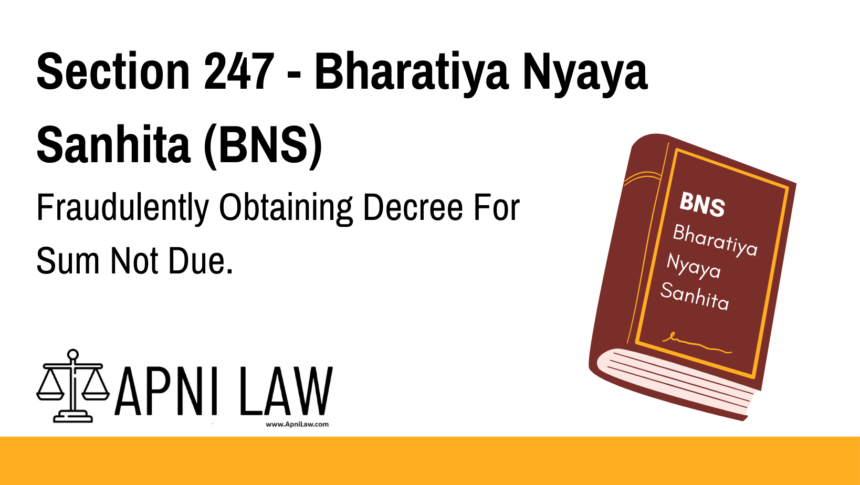Code: Section 247 BNS
Whoever fraudulently obtains a decree or order against any person for a sum
not due, or for a larger sum than is due or for any property or interest in property to which
he is not entitled, or fraudulently causes a decree or order to be executed against any
person after it has been satisfied or for anything in respect of which it has been satisfied,
or fraudulently suffers or permits any such act to be done in his name, shall be punished
with imprisonment of either description for a term which may extend to two years, or with
fine, or with both.
Explanation of Section 247 BNS
Section 247 BNS penalizes individuals who fraudulently obtain court decrees for sums that they are not legally entitled to. This provision prevents misuse of the judicial system to secure wrongful financial gains.
Key Elements of Section 247 BNS
- Fraudulent or Dishonest Intent – The person must act fraudulently or dishonestly.
- Obtaining a Decree for an Undue Amount – The person causes a court order to be passed in their favor for a false claim.
- Intent to Injure or Annoy – The act must be committed to harm or annoy another person.
- Punishment –
- Up to two years imprisonment, and
- Fine.
Illustration
Example 1: False Debt Claim
A files a case against B, falsely claiming that B owes him ₹5 lakh.
The court, based on A’s fraudulent documents, passes a decree in A’s favor.
Since A knowingly obtained a false decree, he is guilty under Section 247 BNS.
Example 2: False Property Decree
X approaches the court claiming ownership of land that actually belongs to Y.
Based on forged documents, X secures a court decree in his favor.
Since X obtained the decree fraudulently, he is liable under Section 247 BNS.
Common Questions and Answers on Section 247 BNS
1. What is the objective of Section 247 BNS?
- It prevents individuals from fraudulently obtaining court decrees for amounts not legally due.
2. What are the key elements of this offense?
- The person must:
- Act fraudulently or dishonestly
- Obtain a court decree for a sum not due
- Have the intention to injure or annoy someone
3. What is the punishment under Section 247 BNS?
- Up to two years of imprisonment and fine.
4. How does Section 247 BNS differ from Section 246 BNS?
- Section 246 BNS applies when a person makes a false claim in court.
- Section 247 BNS applies when a person fraudulently secures a court decree in their favor.
5. Is this section applicable to civil cases?
- Yes. Fraudulent claims in both civil and criminal cases fall under this section.
Conclusion
Section 247 BNS protects the legal system from fraud by punishing individuals who wrongfully obtain court decrees. This law ensures fairness in judicial proceedings and prevents misuse of court processes.
For more legal insights, visit ApniLaw today! 🚀











